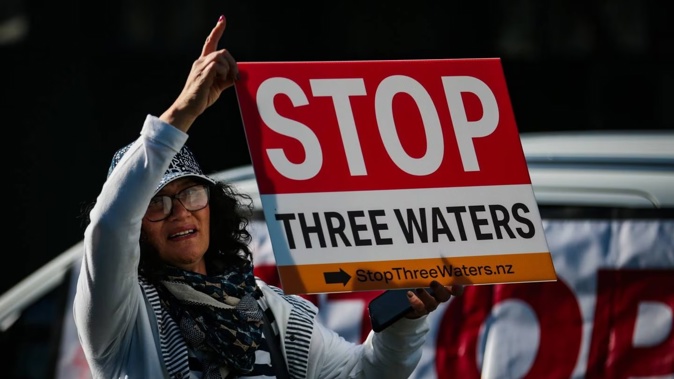

A High Court challenge by three councils to the Three Waters reforms, seeking to stop the Government “taking” local assets without compensation, has failed.
The legal bid effectively sought to influence the legislative process, a role the High Court at Wellington said it was not satisfied it should have.
Instead, the Court has ruled the Government can continue creating legislation to enact the controversial Three Waters reforms.
Three Waters, which refers to drinking water, stormwater, and wastewater, has faced intense political criticism but the Government said it was crucial for enabling critical changes to improve and better manage water services delivery.
These services are currently provided by 67 local authorities to their communities through infrastructure assets owned by those councils.
Four new publicly-owned water services entities have been established, organised geographically, with further legislation intended to transfer those local assets to the entities without compensation.
In June last year Timaru, Whangārei and Waimakariri councils took the case to the High Court seeking declarations on the rights and interests that property ownership entailed.
The councils sought legal clarity on the matter saying that under Three Waters reforms, the Government was “expropriating” council-owned property without conceding that it was “taking” the assets, and “without fair compensation being paid to communities for their property”.
The councils said the Government’s proposals removed local democratic accountability associated with the management of those water assets.
- Mike's Minute: We are liable for the Three Waters debt, not the Government
- Mike's Minute: Three Waters spending is now grossly wasteful
- John MacDonald: Does Auckland show a need for 3 Waters reforms?
Mayors Nigel Bowen, Dan Gordon and Sheryl Mai took the legal action on behalf of their communities, they said, contending the Government’s action was “incompatible with long-standing and fundamental laws around property ownership and democratic accountability”.
/cloudfront-ap-southeast-2.images.arcpublishing.com/nzme/AEWJMUTGIECD5YRRUMJSDZOSU4.jpg) Timaru District Council mayor Nigel Bowen said his council's legal challenge against the Government was about more than just Three Waters. Photo / Timaru District Council
Timaru District Council mayor Nigel Bowen said his council's legal challenge against the Government was about more than just Three Waters. Photo / Timaru District Council
At the time Timaru mayor Nigel Bowen said the case was far bigger than just the Three Waters reform because it could have serious implications for all property owners.
“Property rights are absolutely fundamental in New Zealand. If you’ve bought and paid for something you should have reasonable control over it, and a legitimate expectation that it will not be expropriated without compensation.
“As owners on behalf of the community of this critical infrastructure we want to ensure that any future changes respect these basic rights,” he said.
“While Three Waters reform prompted this action, what we’re talking about here concerns some really basic and fundamental rights that most people ordinarily would take for granted and normally wouldn’t be up for discussion or even be a source of contention.”
Bowen said Three Waters reform would undermine basic property rights and set “a risky precedent for New Zealand”.
“We don’t believe that concepts such as collective ownership with no control of assets and ‘shares’ that don’t deliver any of the usual rights or obligations that go with equity ownership, are in line with existing property rights and laws.”
The councils sought declaratory relief from the Court; that local infrastructure assets were owned and controlled - and related services were provided - by local councils.
They also wanted declarations that the councils’ rights of infrastructure asset ownership included the exclusive ability to prevent others from interfering with such assets and the exclusive possession or control of those assets.
The proceeding was initially brought against then Local Government Minister Nanaia Mahuta, who lost the portfolio to Kieran McAnulty when Chris Hipkins became Prime Minister.
In her just-released decision, Justice Jillian Mallon agreed with the respondents, McAnulty and the Secretary for Local Government, that the declaratory relief was framed too generally to be useful.
In a statement, the Court said the relief was framed without reference to the legislative framework under which local councils performed their functions in relation to Three Waters services and that Parliament could enact legislation that altered those traditional functions.
The Court also agreed the declaratory relief was outside its proper role because it infringed the principle that the courts do not interfere with legislative process.
“While the declarations had been carefully framed in an attempt to avoid that principle, they were nevertheless aimed at that legislative process.
“They sought to inform Parliament of important legal principles so that Parliament could take account of them when considering that legislation.
“In effect, they sought to influence the legislative process. The Court was not satisfied that this was a role it properly should have.”
Justice Mallon also agreed with the respondents that the declaratory relief would not usefully serve the purpose of informing Parliament of relevant and important legal principles.
She said the general legal principles were not in dispute and there was an opportunity to consider them during the legislative process, for example, through Select Committee.
However, the intention of the reforms was to change the way Three Waters services had been provided historically, with a new form of governance arrangements intended to bring benefits to communities nationally.
“Parliamentary sovereignty means that these changes may be made through legislation even though it will change local democratic governance and accountability for these services and even though local authorities will lose ownership rights of their Three Waters infrastructure assets without receiving compensation for their value.”
The application for declaratory relief was dismissed. The Water Services Entities Act 2022 will come into force on July 1 next year.
-Natalie Akoorie, Open Justice

Take your Radio, Podcasts and Music with you









